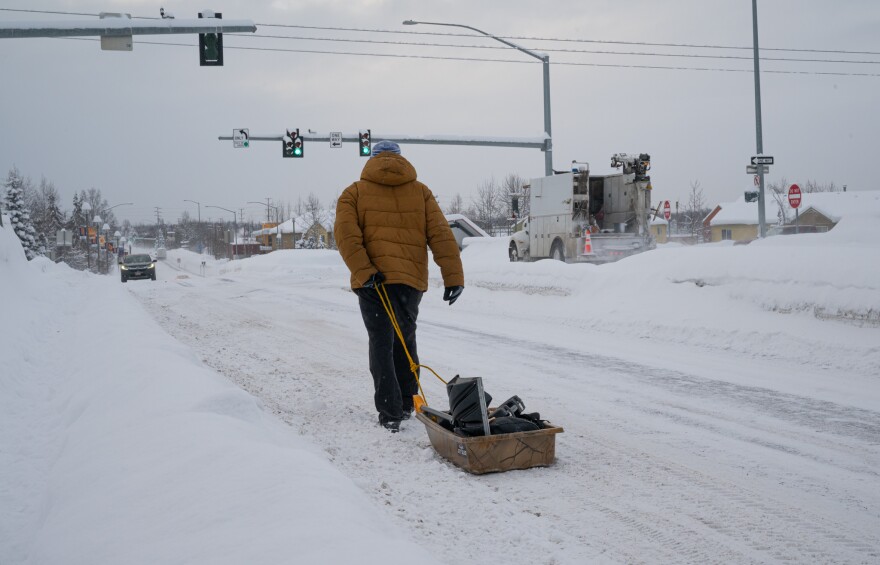Alaska has had quite a wintry start to 2024. The Interior's seen temperatures nearing 60 degrees below zero. Parts of Southeast have gotten record-breaking snowfall. And Anchorage — often a microcosm of the state as a whole — has had a taste of all of it.
Simply put, Alaska's winter is defying predictions that an El Niño climate pattern would produce a warmer, less-snowy season.
National Weather Service climate researcher Brian Brettschneider, from our Ask a Climatologist segments, says that while the snow is notable — and yes, temperatures have been cold recently — we're still living in an Alaska that's warmer than it used to be.
Take Fairbanks, for example:
Listen:
This interview has been lightly edited for length and clarity.
Brian Brettschneider: The cold that they (Fairbanks) had the other day, which got down to minus 43, you know, now that happens about, on average, once or so per year. And historically it happened 10 or 12 times a year. So it can still happen, it can still get that cold, but much less frequency. And the deep cold, the 50s below (zero) used to happen every year, and now it may happen once a decade.
And this is probably going to be a little bit unpopular to state this, but in Fairbanks, the UAF outdoor thermometer and the Fred Meyer West outdoor thermometer tend to run a couple of degrees too cold. So when people are standing out there (taking pictures), and it says minus 40, it's probably not quite minus 40. Still cold, but those have a little bit of temperature, inflation or, I guess, deflation.
Casey Grove: And even colder if you take off all your clothes except for a bathing suit, right?
BB: Oh, definitely.
CG: So here in Anchorage, too, it's been fairly cold. And in my time here, I don't remember it getting colder than 15 below. But that's about what we hit over the weekend. Is that notable? Is that a record or anything?
BB: Really across much of the western two-thirds of the state, this is this is about a four-year cold snap. So it's been about four years since we had a cold snap this intense and of this duration. So, you know, officially, the Anchorage International Airport has only been down to minus 8. But elsewhere around town, Merrill Field was minus 19. Campbell Creek Science Center was minus 24. And it's going to get similarly cold here by the end of the week.
CG: I thought that we were going to have a warm winter. We were all worried that it was going to, like, rain or something in the middle of the winter. And the, you know, the snow forecasts were going to be low for this year, just based on the seasonal outlook from NOAA and the El Niño prediction. And yet here we are, you know, there's been tons of snow, there's been some real cold days. What happened?
BB: Well, would you believe me if I said we are still in the warmest one-third of winters on record in Alaska?
CG: I know by now that I should believe you, but some people might not.
BB: So for the month to date through (Jan. 28), Alaska is just slightly warmer than normal for the month of January. And we were half a degree warmer in the month of December. And those are against the 1991 to 2020 normal periods, which is much warmer than previous decades. So for recent years, this is kind of an average year. Historically, this is still quite a warm winter.
Really the most noteworthy part is the snowfall. In an El Niño winter, we typically were more likely to get some winter rain events. But we've really kind of threaded the needle this winter. When we have had storms come through, they've pretty much been all snow, and so we've been able to really pile up the snowfall.
CG: So, I mean, we're sitting here in Anchorage, and it's notable that it snowed as much as it did, and as cold as it was, and affected as many people as live here. But down in Juneau and in Southeast in general here recently they've seen a ton of snow, right?
BB: Yeah, especially in Juneau. So January has now had 70 inches of snow, and that is the third snowiest month on record at the airport. But this is really an extreme amount of snow for the Juneau area. Now, they've really flipped the switch. They had their deepest snowpack in over 50 years just five days ago, and now it's gone. And they've been setting record high temperatures. So while, on average, statewide, the last few days have been the coldest days since January 2020 — so in four years — that's occurred while, you know, Sitka and Ketchikan have all set record high temperatures and are receiving lots of rain.


